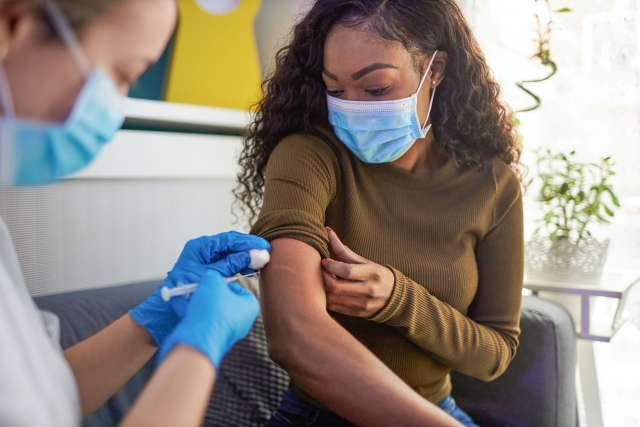As infections from the delta variant surged and studies showed decreasing protection from the virus, supplemental, or “booster,” third shots of the COVID-19 mRNA vaccines — Pfizer or Moderna — were made available to Americans who had received their second dose at six months prior. UCLA infectiousdiseases specialist Otto Yang, MD, talks about the need for a booster, particularly now with the emergence of the new omicron variant.
Did experts expect there to be a need for a supplemental dose?
Dr. Yang: Many of us expected it. A lot of studies show that antibodies drop over time pretty quickly, either after natural infection or after vaccination. There are parallels to other common cold coronaviruses. It’s well known that immunity against those only lasts for a few months. It’s not surprising that this coronavirus also has fairly short-lived immunity.
How have the new variants impacted the need for boosters?

Dr. Yang: They have accelerated it. The antibodies are dropping over time. The amount you need to protect against the original strain is much less than the amount you need to protect against delta, and perhaps omicron, as well, since they’re not specifically directed at those variants. So, antibodies drop below the level as quickly as someone who didn’t previously have COVID.
“There are parallels to other common cold coronaviruses. It’s well known that immunity against those only lasts for a few months.”
Is there anyone who likely would not need a third dose, such as healthy young adults?
Dr. Yang: Probably everybody should get a booster. The vaccines are so safe and effective, and the risks of them are so small, there really isn’t a downside to getting a booster, especially if someone has already tolerated the first shots.
“If the booster does bring the levels of antibodies up, then the antibodies should still cover the current variants once they reach sufficient levels.”
Do you think we will need a COVID-19 shot every year like with the flu vaccine?
Dr. Yang: My guess is that it’s probably going to be annual vaccination and, depending on how quickly the virus continues to evolve, it may need to be one that’s against the prevalent circulating strain, like the flu vaccine. It’s still not clear how long vaccine protection lasts with antibodies. The variants have kind of thrown a wrench in that, so we don’t know how long immunity would have lasted with the original strain.
How effective do you expect supplemental shots with the original vaccines to work against the variants?
Dr. Yang: They should still be effective. If the booster does bring the levels of antibodies up, then the antibodies should still cover the current variants once they reach sufficient levels. There’s also the possibility boosters will improve the quality of the antibodies, as well. The more the immune system is exposed to something, the better those antibodies become with repeated exposure.
Is there something special about the sixmonth time frame for someone to receive a third dose?
Dr. Yang: There’s nothing magic about it. The decision to administer boosters, originally at the eight-month mark and now at six months, was based on what had been observed up to that point, which are breakthrough infections. Israel has a really great program in place to monitor their population because they have a centralized health system. Their data show that within four or five months, the efficacy of the vaccine drops tremendously, in terms of preventing someone from getting infected. However, the good news is that looking at the same data, the vaccine protection from getting seriously ill and requiring hospitalization was still way over 90%. I think what that means is that while people who were vaccinated several months ago are becoming more and more susceptible to getting infected and spreading the virus, it looks like they’re still protected from getting seriously ill.
Based on your research, do you think fully vaccinated people who have previously had COVID-19 need a third dose?
Dr. Yang: They probably will need a booster, but they may not need it as soon for a couple of reasons. They start off with higher levels of antibodies. Even if their antibodies are dropping, they’re not going to reach the same critical level to protect against variants much sooner than against the original strain.
What’s more effective: getting first doses to more Americans or providing supplemental doses to those who already have been vaccinated?
Dr. Yang: I think both should be prioritized. If the goal is personal protection, then getting boosters is pretty important because eventually a person’s T cells may also go down — it is the T cells that protect us if the virus gets past our antibodies — and then people won’t be protected in terms of getting really sick or dying. In terms of public health and reducing spread of the virus, even somebody who is some months out from having received their second dose of vaccine will get milder infection and be less contagious. So, you might get more bang for your buck if it goes into somebody that hasn’t been vaccinated at all. And, of course, those people are at much higher personal risk of severe illness.

